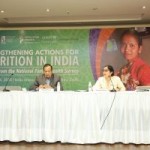“The multidimensional analysis of National Family Health Survey data will help us navigate the health and nutrition programs, and understand the gaps that must now be closed,” said Dr Vinod Paul from NITI Aayog. He was delivering the keynote address at a knowledge sharing event where multiple researchers from organizations such as International Food Policy >> Read more Source: POSHAN: Partnerships and Opportunities to Strengthen and Harmonize Actions for Nutrition in India
Abstract Digest on Maternal and Child Nutrition Research – Issue 22
In this issue of Abstract Digest, we have brought together a collection of articles and systematic reviews on multiple aspects of nutrition including stunting, micronutrient supplementation, adolescent nutrition, and policy analysis. Here are some of the highlights: Bhatia and colleagues (2018) examined the trend in inequalities in infant mortality rate (IMR) in Indian states >> Read more Source: POSHAN: Partnerships and Opportunities to Strengthen and Harmonize Actions for Nutrition in India
Aflatoxins in food and feed: Is women’s empowerment the solution to this challenge?
This is one of several angles that Lynn Brown, independent consultant, assesses in the GCAN Policy Note No. 9. Aflatoxins affect all of Africa and the severity of the impact might well grow under climate change (as a forthcoming GCAN modeling study by IFPRI and the University of Florida is currently assessing). The two key […] Source: Gender, Climate Change, and Nutrition Integration Initiative (GCAN)
Gender and Resilience Webinar – June 21 2018
Gender norms and power dynamics can play significant roles in influencing the ability of people, households, and communities to build resilience capacities and put them into practice in the face of a shock or stress. On Thursday, June 21, Mercy Corps’ BRIGE program and GCAN researchers will give a webinar to share BRIGE’s lessons from […] Source: Gender, Climate Change, and Nutrition Integration Initiative (GCAN)
Training helps improve agri production practices: Survey
Interactive training on agriculture and nutrition enhances the knowledge of improved production practices for both crops and non-crops such as vegetables and fruits, according to a survey. The increase in knowledge was particularly large for women, the survey said. Besides, women become empowered in ownership of assets and decision-making, especially related to agriculture, nutrition and […] Source: IFPRI Bangladesh Country Office
